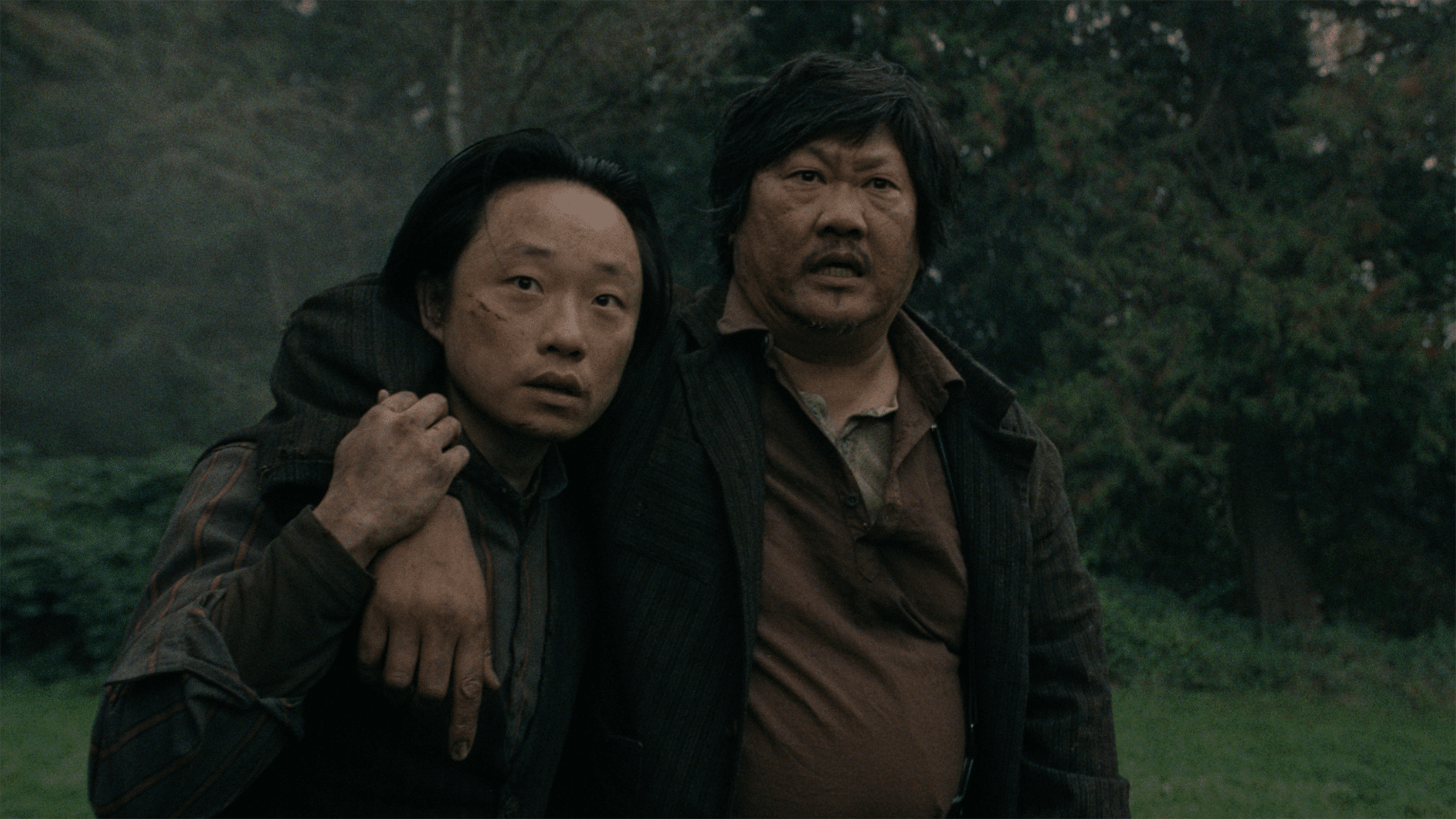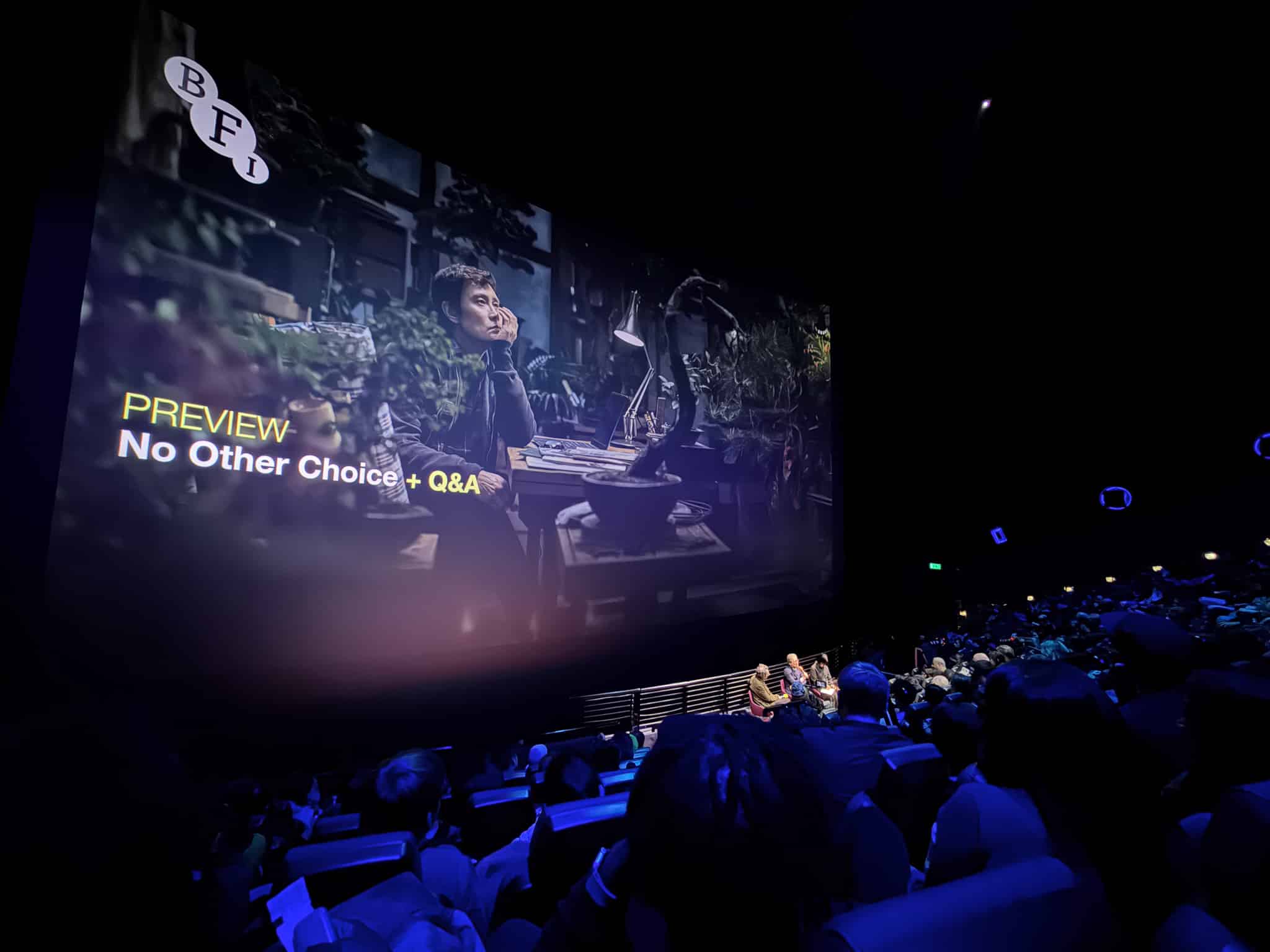Clowns aren’t traditionally ones to be taken seriously but in the case of Singaporean clown Shanice Stanislaus, the whimsical traditional circus art form is being transformed into a powerful theatrical masterpiece.
Having trained under the “Dumbledore of Clowning”, Philippe Gaulier, whose alumni include the likes of Sacha Baron Cohen and Emma Thompson, Stanislaus has established herself as a distinguished performer in her field.
Her play, Mail Ordered, which explores the brutal reality of human trafficking through the satirical medium of clown performance, has won a slew of awards in Canada. But yet, her creative and performative talents have gone unrecognized and unappreciated on home ground.
Broadway World praises Stanislaus’s play for “succeeding beautifully in doing what it wants to do, which is to generate laughs while causing the audience some genuine discomfort,” whilst the Toronto Star described Mail Ordered as “something special – hilarious, uncomfortable, subversive.”
However, despite winning the Pick of the Fringe Award in Vancouver, the Patron’s Pick Award in Toronto, and the Jester’s Cap Emerging Artist Award in Calgary, Stanislaus still remains under the radar in the Singapore theatre scene.
Stanislaus sat down with Resonate to discuss her career in Singapore, her journey abroad, and the challenges facing her and the industry.
Leaving Singapore
CC: What got you into being a clown?
SS: I love making people laugh. My teacher said I was funny even when I was trying not to be. It’s very freeing and it’s a very different way of approaching performance. You’re so present and you’re forced to be with the audience.
I felt this way of being, not just as an actor, but as a human being, is not taught to us here in Singapore. We’re so stressed and so serious all the time. Always trying to get things done. And clown for me was more than just the performance level. It was about being free and being able to find joy in making mistakes and failing.
I wanted to learn that because I spent 20 years of my life learning something else, that we have to be good, we have to be the best, we have to hustle, we have to make it work. It’s freedom from that.
“I love making shows that are a mix of my Singaporean experience with people from abroad.”
CC: What led you to France to train with Philippe Gaulier?
SS: I felt like I had lost my sense of place in Singapore. I was working a marketing job but I was always in love with the arts before that job. When I was in school, I was working with a dance company. But then school finished. Then university finished. I was so depressed here. Everyone was so serious. So I left to enroll in Gaulier’s school for about two years. The pandemic happened in between, so yeah, about two years.
CC: What was your experience like?
SS: It was awesome! Gaulier is a really famous clown teacher and his school is the clown school in France. I learned a lot. He trained Emma Thompson and Simon McBurney, Helena Bonham Carter, and Sacha Baron Cohen.
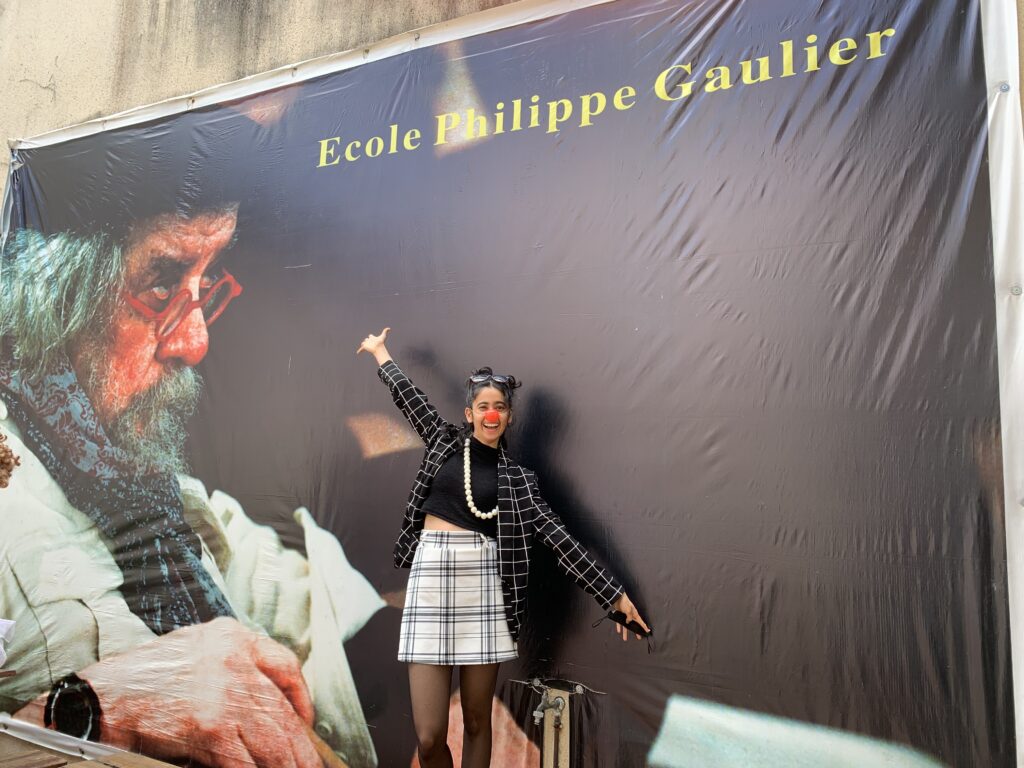
CC: And this led you to Canada?
SS: Yeah, during my time in Gaulier’s school I met a Canadian producer who was also a student at the school. We were doing some mini shows together and we really liked working together so she asked me if I wanted to come to her theatre in Calgary – the Centre of Artistic Development. “I’m bringing some international clown artists to a new theatre in Calgary and it’ll be nice for you to come,” she said.
“Imagine minus 30 degrees Calgary winter in some basement studio.”
I didn’t know anything about Canada and Calgary. I’d finished clown school and went straight into quarantine because of the pandemic. I was figuring out what to do next and when I got the offer to go to Calgary I thought, “Yeah I’ll go, I don’t care.”
CC: Was it just you? What was the environment like there?
SS: There were five of us in this residency from all over the world, including a German, a Brit, and an American. We were all there to make our own work. It was there that I met Canadian director Aaron Coates, who was hired to facilitate the making of the work. Imagine minus 30 degrees Calgary winter in some basement studio.
CC: Tell us about your work there.
SS: I wanted to make something that was half Southeast Asian and half Canadian. Because like I came from so far away, it felt like such a rare opportunity for Singaporeans to be in my position to make work. I wanted to create something that involved the community but it was just a dream, I didn’t have any ideas.
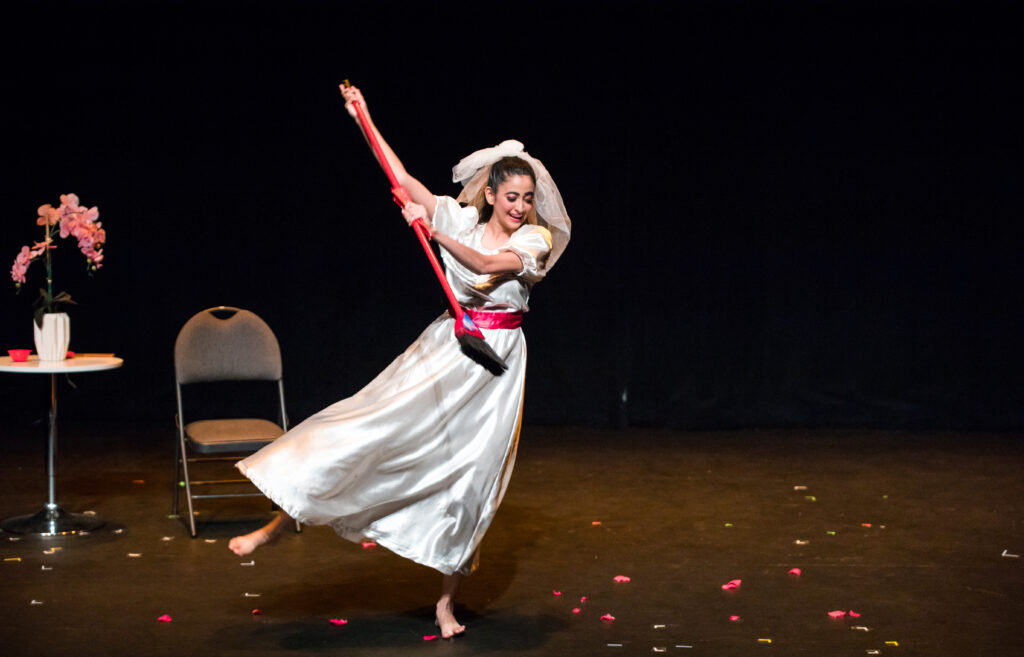
Aaron was giving us a lot of exercises and one day he asked us to come in costume as a character. I didn’t bring any costumes but wanting to prove myself, I went to the closet there looking for an extravagant dress. I found a wedding dress and thought it was perfect. I started selling myself to Aaron as a mail-order bride and that’s how the show started.
Mail Ordered Trafficking
CC: What is Mail Ordered about?
SS: Mail Ordered is about this girl I play, Lila, a poor village girl arrives who arrives in North America, looking for a husband. She sells herself to any man who can buy her for 100,000 US dollars. It’s a satirical reflection on human trafficking. It’s satire, it’s a lot of parody, and it’s comedy, but a lot of my work is using comedy to talk about serious issues.
When I enter the stage, people don’t know it’s about human trafficking. It seems like a very innocent girl who’s clowning around, making people laugh. That’s when I open up the access points for people to listen to a story that is very true and very hard. I set it up with comedy and lightness and I think that helps people receive the information better.
CC: Mail Ordered explores quite a dark theme to say the least. What made you choose human trafficking as a focus?
SS: Honestly, I wasn’t planning to write about trafficking or the mail-order bride industry, it was just in the moment. So I started to come up with this girl called Lila, who is from Southeast Asia and from an unknown village who hasn’t experienced feminism in her life. And she thinks that by selling herself to this man in Canada, she will achieve her dreams of honoring her family. From there, I started to build the show.
“I don’t wear the red nose.”
CC: Where did you build your knowledge and inspiration about human trafficking?
SS: I do a lot of community work in Singapore and in the region. I spent ten years doing dance parties. I threw some of these dance parties in villages in Cambodia where we’d get together and dance together. But over those ten years, I started hearing girls and children being trafficked. I even had students that I taught who would disappear the next year because they were sold by their families.
I knew all these stories and when we were doing the theatre exercises, something just erupted in me. A lot of these girls are still bought and sold today, and many of the buyers are from Europe and North America.
CC: What aspect of Mail Ordered is “clown” performance?
SS: A lot of it is the audience interaction, which is key in clown performances. I don’t wear the red nose but a lot of clown shows are trying to break the fourth wall. We are very present with the audience. The reality of the circumstances is right there right now.
I literally come in asking men to buy me for 100,000 US dollars. The whole show is me just doing many things to really get like the men in the room to try and buy me for 100,000 US dollars. I show them how good I am at domestic chores and how my parents are in debt. I’m quite reactive to what the audience is doing.
I think that what makes it clown – every show is different. There are a lot of unexpected surprises as well, and a lot of responding to the audience.
Award Season But Not in Singapore
CC: How was Mail Ordered received?
SS: The team was half Singaporean and half Canadian. We did our first run in Calgary in March 2022 to a small audience and I thought no one would like it because it’s a bit edgy and provocative. I didn’t think anyone would care about what I had to say, me being from Southeast Asia. I actually really thought people would hate it. But then all these Canadians came up to me and told me not to change anything. Jeanise Jones, who played the babysitter in Borat 2 even came to see it. I was starstruck! She was sitting in the first row!
“But then I came back to Singapore but nobody cared.”
CC: Mail Ordered won a series of awards in Canada, how did that come about?
SS: We took it on the road and it was well received. I came back to Singapore to hire a Singaporean producer, sound designers and an actor. I brought the team on tour with me on tour in Vancouver and entered the Fringe Festival, which was next level. It’s not community theare any more.
We ended up winning the Pick of the Fringe Award and we were stunned. There are around 70 shows in the festival and they give the award to the top seven. We got it. That was the moment I realised people really like my work.
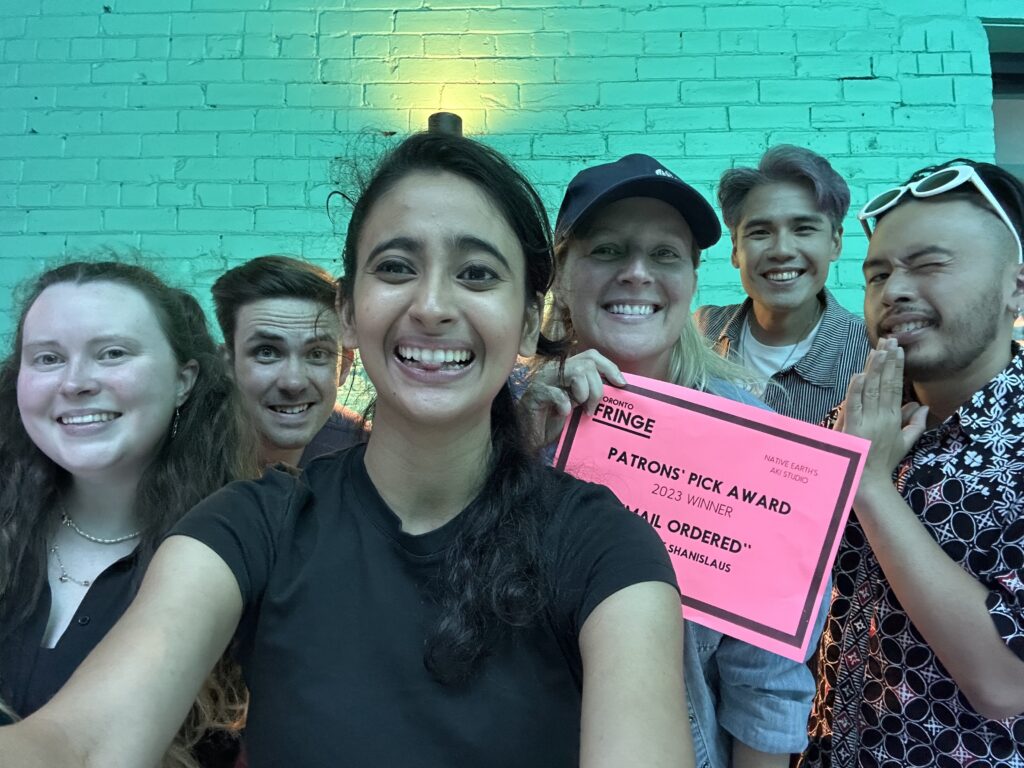
But then I came back to Singapore but nobody cared. Nobody cared about us winning. I thought the award in Vancouver was a big milestone for us. We even pitched the story to a few local media outlets in Singapore but one picked it up. No one cared.
People higher up in the institutions here were telling me the award wasn’t good enough, which is why no one was picking it up.
“We sold out.”
CC: Why do you think there wasn’t much of an interest when you came back to Singapore?
SS: I think arts industry here is a bit small, and I’m considered very fringe, progressive, and out there. I think I don’t fit into the norm here, but you know, that’s fine. I accept it. But that means also that sometimes, the work that I do, may not get like the kind of recognition that it deserves.
CC: So what did you do next?
SS: I thought fine, let’s just go back on the road again. I wanted to keep it going. So we got a grant from the Art council and went on tour again. We got into a bunch of festivals: Toronto Fringe Festival, Winnipeg Fringe Festival, Calgary Fringe, Edmonton Fringe, and Pine Box Rock Shop in New York City. We even sold out our shows in Toronto, where we won the Patron’s Pick Award.
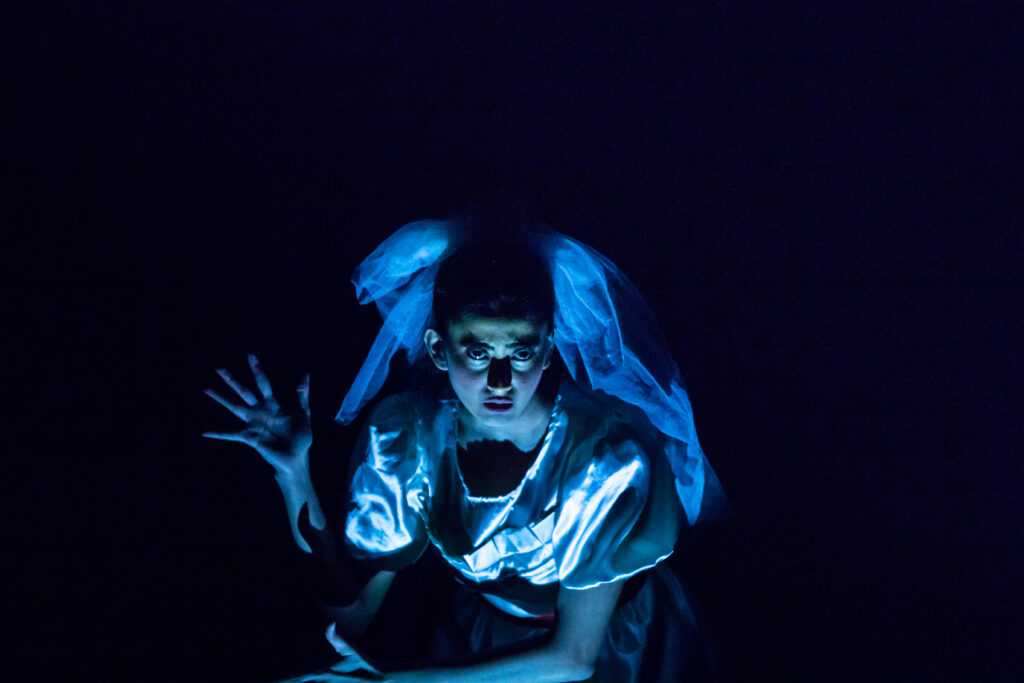
Toronto was a sold out show. Returning to Calgary, where we started the show, was nice. We ended up wining the Jester’s Cap Emerging Artist Award there.
Winnipeg was interesting as it’s a very conservative town. They have a bad human trafficking situation, and it was clear to us when we arrived that there were issues in the city. 20% either hated me as an actor or the show itself.
It was great to play in Edmonton too – it’s one of the biggest Fringes in Canada and North America. We sold out there. We only managed to do one night in New York City but we sold out too.
One Singapore
CC: Since returning to Singapore, what are your next steps?
SS: I definitely want to put Mail Order on tour again. I definitely want to bring it to the UK, like we did with the North American tour. In the meantime, I’m trying to write a new show for Singaporeans. A clown show for Singaporeans. Mail Order worked because I was using satire of being Asian in a Western context. It made a lot of sense there but I don’t know if it will make a lot of sense in Singapore, maybe it’s too edgy.
CC: Why is it important to expose the art of clown to Singaporeans?
SS: I never felt very recognized in Singapore and I thought I wasn’t good enough, which is why I went to train to improve my craft. I felt, and I still feel, that Singapore is a bit of a well and small market. No hate to Singapore, I don’t hate my city! I want to teach more clown and make more of this work to contribute back to the industry.

We’re the next generation. It’s hard right now but the old guard won’t be here after a while. I try to see myself as not just someone who is in the Singapore art scene but someone who is Singaporean and can work in different markets. I love making shows that are a mix of my Singaporean experience with people from abroad.
Photos by Ryan McDonald


